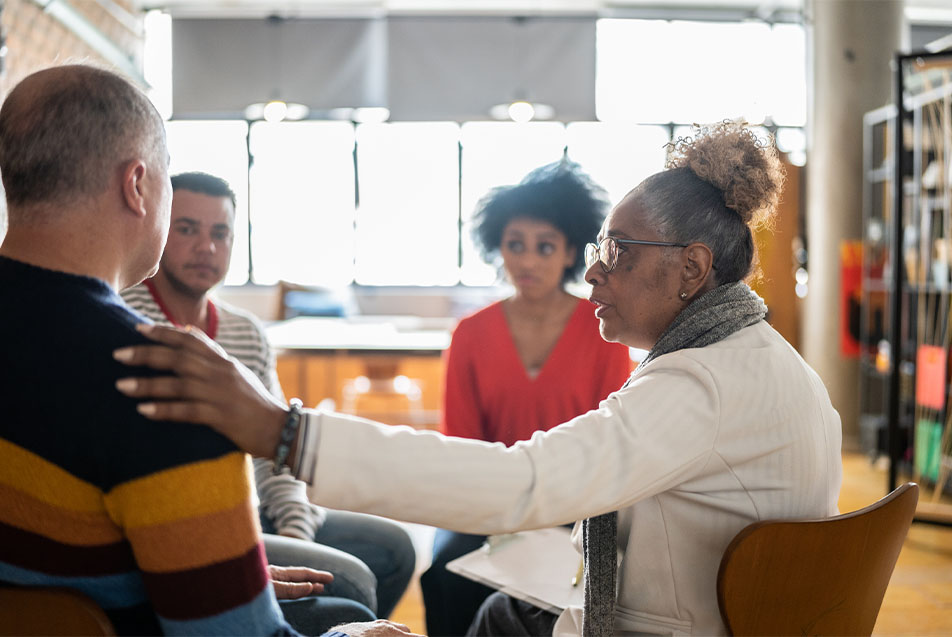
This post was written by Cathy Petrie, LCSW, hospice bereavement counselor, Parkview Home Health and Hospice.
“No one ever told me grief felt so like fear.” This is the opening sentence from a book by C.S. Lewis titled “A Grief Observed.” Fear can prevent us from healing from grief, and fear that goes unexpressed can grow and become paralyzing.
Often, those who have lost a loved one will see and feel their absence in everyday reminders, which can tap energy levels, cloud thought processes and affect decision-making. Navigating the grieving process while taking on new roles in daily living and honoring their relationship with that person requires patience and courage. Yet, having access to a counselor-led support group and, most importantly, surrounding themselves with other mourners with similar thoughts and feelings can bring relief and normalcy to a daunting journey.
At Parkview Hospice, we have a longstanding commitment to bringing hope to those grieving in the communities we serve. In the beginning, we surveyed senior community centers, extended care facilities, schools and funeral homes to identify the needs of those experiencing grief. Based on the results, we formed grief support groups that provide a comfortable space for families and community members to share their pain, receive spiritual and emotional support and learn about the grieving process. We also gift each member a copy of “Understanding Your Grief” by Dr. Alan Wolfelt, and our discussions focus on how they can relate their grief experience to the key points in the book.
Beyond that, grief and bereavement support groups offer numerous benefits to participants throughout their journey and the grieving process. Let’s explore some of those benefits now.
Benefit No. 1 – Acknowledging you aren’t alone
Support group ground rules, such as respecting differences and maintaining confidentiality, are the foundation for encouraging open dialogue. This structure helps group members feel safe in expressing their grief to each other and sharing their personal stories of love, pain and managing their life without their loved one. It also fosters an environment where they can support fellow group members by listening to their stories and validating that they have had similar experiences. All of this helps members feel supported and underscores that they’re not alone.
Benefit No. 2 – Building strong bonds
Another advantage is that group members can build new friendships and support networks that can last long after the sessions have ended. By forming these strong bonds, members can share coping strategies while encouraging and sharing a little grace with one another.
Benefit No. 3 – Educating and embracing others
After attending the support group and reading book passages that reassure us about the grieving process, members are often more at ease with family and friends. They can relay principles learned and feelings of mourning more openly to those close to them. Sometimes, sharing a book with their family or having them join support group sessions helps everyone heal from the passing of their loved one. Educating and embracing the entire family helps calm and fortify bonds.
Benefit No. 4 – Giving back and offering support
In time, it can be a wonderful gift for those who have experienced comfort and healing through the support group to return and assist others in their grief journey. They are in a unique position to discuss how they have grown in their ability to live a transformed life. They can be a source of encouragement to current members, sharing how honoring their loved one has brought meaning and fulfillment to their days. These members can also share insights with those just beginning the grieving process, helping them find their own way along their journey. Discovering purpose helps grievers go on with their lives and honor the person who has passed. This act is indeed a blessing to others.
Benefit No. 5 – Developing community awareness
Doctor offices, hospitals, cancer services, churches, schools, funeral homes, councils on aging and other organizations refer people who have lost loved ones to Parkview’s grief support group. Community members appreciate being cared for by compassionate healthcare professionals and benefit from the camaraderie among support group members and a culture of understanding. Many are grateful Parkview Hospice provides a constant time and place for people to feel supported in their grief.
Benefit No. 6 – Healing and personal growth
Members complete a survey about how the grief support group has impacted their mourning and personal growth. It’s always heartwarming to read their comments. These are a few of my favorites:
“It was so good to know I wasn’t alone and realize that others were going through the same emotions.”
“Knowing it's OK and normal to have these feelings and bursts of grief has made me aware of ways I can deal with the issues of my husband’s death and start to move forward.”
“Our group friendships have lasted nine years now.”
Benefit No. 7 – Reconciling grief
Our grief and bereavement support group philosophy is, “We are here for you.” It emphasizes Parkview Hospice’s dedication to helping those we serve to heal from grief and experience renewed hope and purpose in their lives.
Seeking support
If you are dealing with losing a loved one, we invite you to contact Parkview Hospice for grief and bereavement support. Cathy Petrie co-leads a grief support group with Rev. Ken Weaver, hospice chaplain at Parkview Health, four times a year. For more information or to find a support group near you, please call 260-373-9800.
Helpful resources
“Understanding Your Grief” by Dr. Alan Wolfelt



